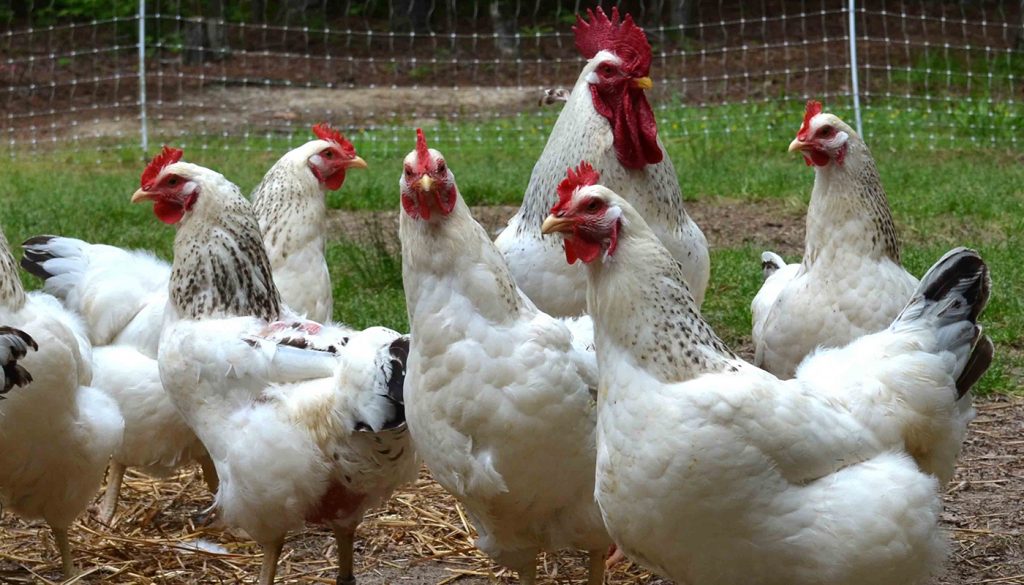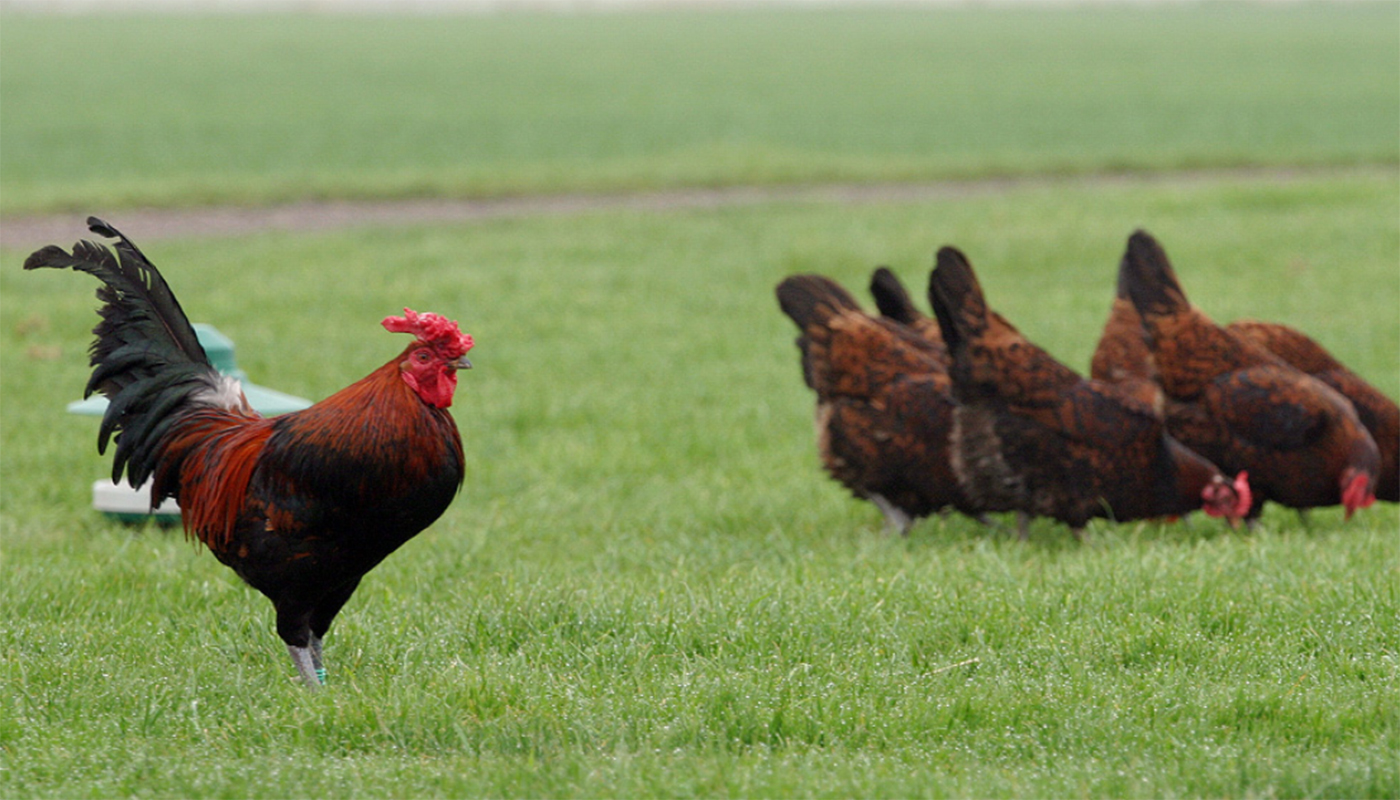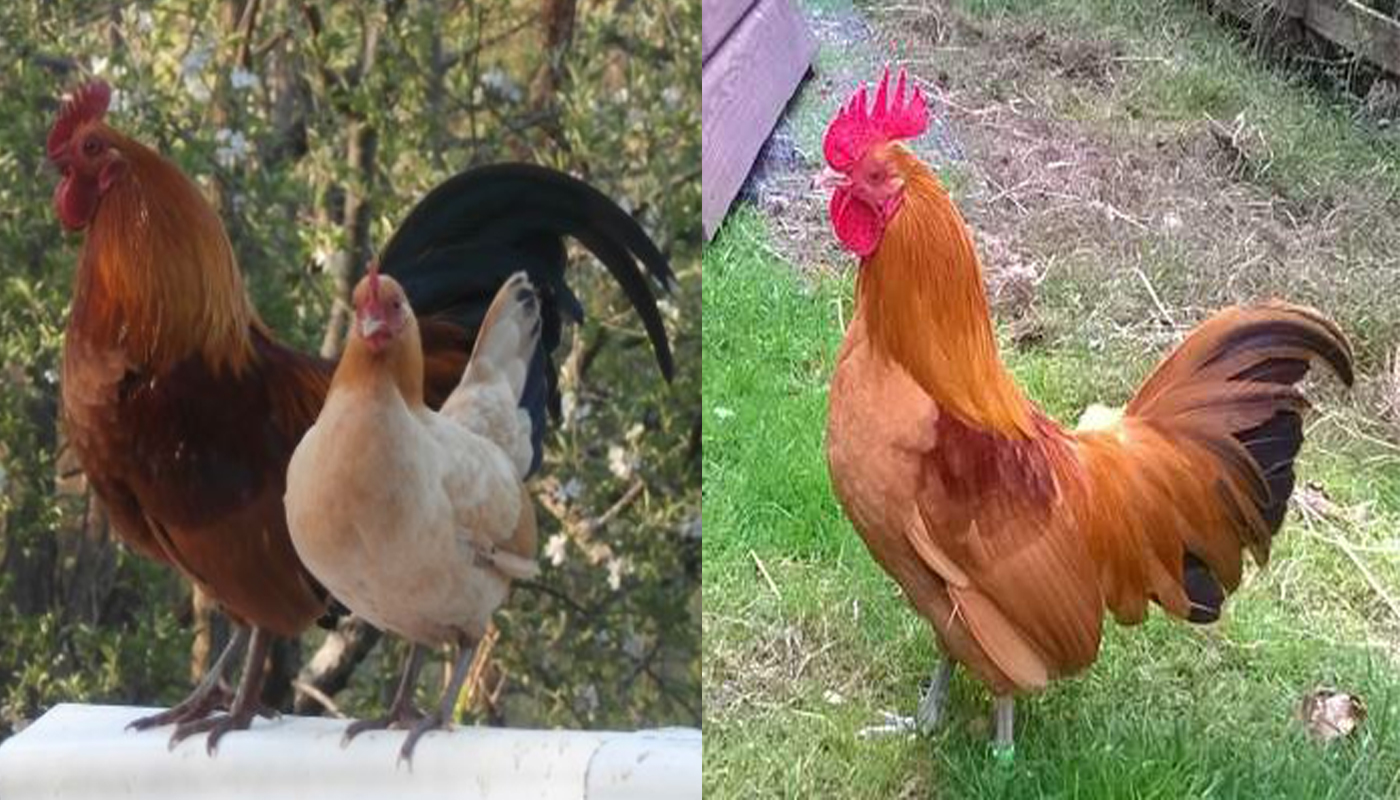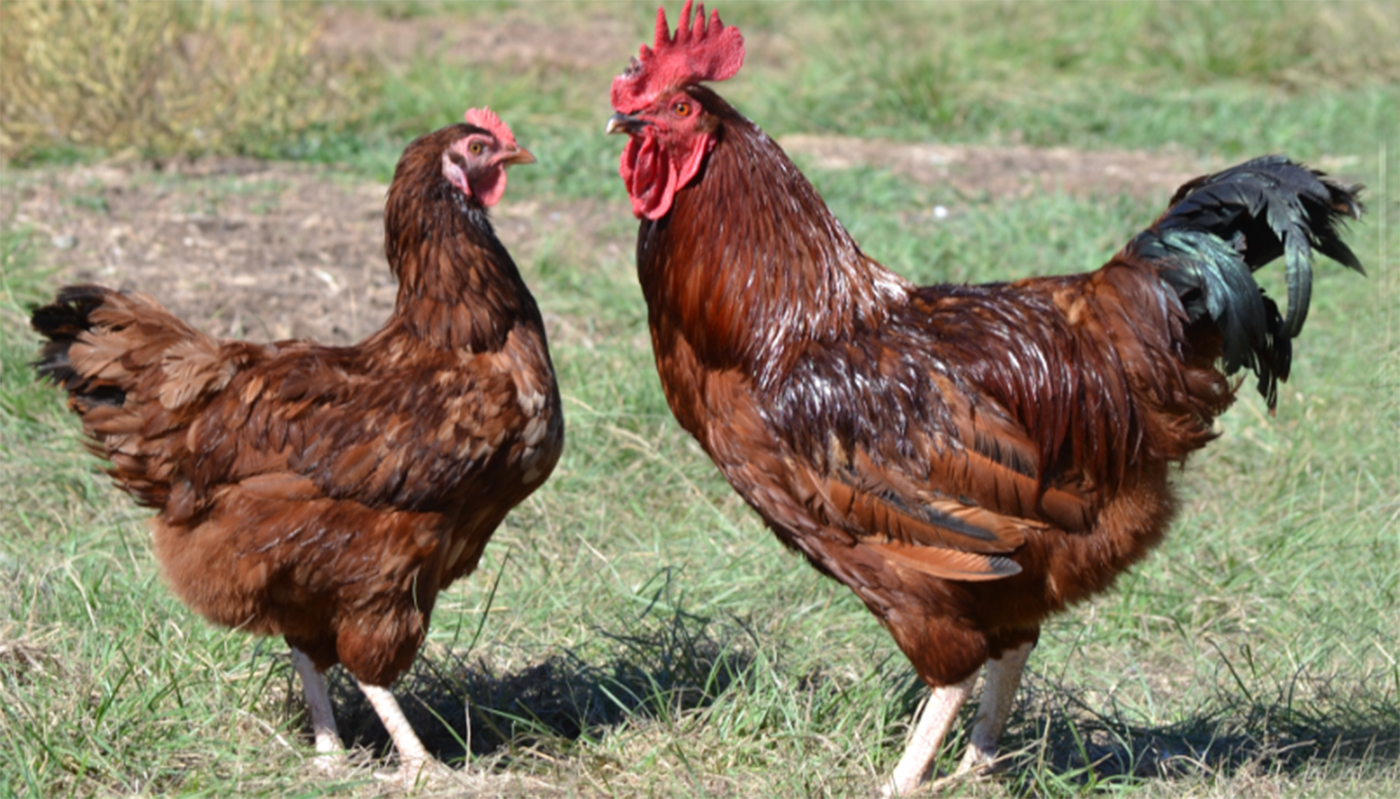
A relatively new breed of chicken having been developed in the 1940’s. These gorgeous girls were produced for both egg and meat production. Delaware chickens are very friendly calm birds that like to keep the peace in a flock and are not very noisy birds. They are easy to handle and make great pets that lay a good amount of eggs all year round.
| Country of Origin: | America |
| American Poultry Association: | Recognized as a breed of chicken in the United States |
| Chicken Category: | Large Breed |
| Chicken Class: | American |
| Bantam Variety Available? | Yes – Single Comb Clean Legged Bantam Classification |
| Good Starter Chicken? | They are a low maintenance chicken good-natured chicken but there are mixed options to them being a good starter chicken. They are also on the Livestock Conservancies endangered list so maybe not the best chicken for a novice. |
PURPOSE⇒ |
Eggs: They are good egg layers.
They lay large to jumbo brown eggs from 210 per year They will lay consistently throughout winter and summer They start to lay eggs from around 20 weeks old.
Meat: They have yellow meat and are a good table bird.
Breeding: They can be bred but are not broody, so you will either need incubation equipment or foster brood hens to sit the eggs.
Breeding Delaware for a show is quite the task as the Standard of Perfection for these birds is quite hard to accomplish. This is due to the limited number of breeding stock available for these endangered chickens. Not advisable to breed for a show for the novice.
Foraging: They love to scratch and forage about. They do tend to do well in confinement, but it can make them quite grumping. They prefer to forage and free range.
Show Bird: They can make good show birds. Although they are quite rare and good breeding stock is hard to come by to reach the exacting Standards of Perfection for these chickens.
Pets: They are calm, inquisitive and friendly birds that can get a bit grouchy when unhappy.
Other: They are not a small bird, but their white feathering makes them an easy target for night predators.
|
| Flyers? | They are good flyers and do love to fly. |
| Noisy Birds? | They are not noisy chickens they prefer to quietly forage about in the sun. |
| Interaction with other chickens: | These chickens have individual personalities, and some will mingle with other breeds others will shy away. It depends on how they are raised and socialized as chicks. As with any flock if you are introducing new birds it is best to slowly socialize them with the flock. |
| Good with kids? | They can be good with supervised kids as they tend to be calm, friendly and easy to handle. |
HISTORY
Delaware was created in 1940 by George Ellis from Delaware. At first, he named the breed Indian Rivers but later came to name them Delaware after the state they were created in. He crossed the New Hampshire hens with the Barred Plymouth Rock roosters to create Delaware.
In the 1940’s companies such as Perdue Farms, the Delmarva Peninsula supplied the entire USA East Coast with chicken. Delaware was created in the Delmarva Peninsula, became a fast favorite as a premier broiler in this region.
They were accepted into the Standard of Perfection by the American Poultry Association in 1952 for show purposes.
As these birds tend to mature quite quickly they made for good production birds but their production fell when the commercial farmers started to use the new White Cornish-Rock cross breed instead.
Bred as a production bird they were not meant for the backyard coop but they’re prolific large to jumbo egg production and good nature soon had backyard chicken enthusiasts and breeders interested in the beautiful Delaware breed.
CHARACTERISTICS |
|
|---|---|
IDENTIFICATION⇒ |
Appearance/Body: A medium to large breed bird with smallish upright tail feathers. Their unique feathers have a white shaft and quill. They have bright red color combs, ear lobes and wattles. The bright soft white feathers have a light black to dark grey barring on the ends of their tails, wings and hackle. They have clean light-yellow legs and beak.
Color(s) Delaware’s are white with a dust of light black to greyish on the feather tips and hackles.
Comb: They have a single comb
Ave. Weight: Pullet/Hen 5.5 – 6.5 lbs.
Cockerel/Rooster 7.5 – 8.5 lbs. |
| Life Expectancy: | As with most birds bred for egg production they do not have a very long lifespan. Depending on their environment 2 – 5 years. |
| Health: | They have no known health issues and are quite a hardy bird. They may need their combs protected from frostbite in harsh winter climates. |
| You may Also Like: | HOW TO TELL IS A CHICKEN IS SICK |
| Temperament: | Calm, quiet and generally friendly if raised correctly |
| Socialize Behavior? | They can get along well with all other animals |
| You may Also Like: | HOW TO SOCIALIZING YOUR NEW CHICKENS |
| Known predators: | Most domestic animals leave them alone, but it is always best to keep an eye on dogs and cats. If hawks and or foxes are in your area it is always best to take precautions. Their white color can make them easy targets for night predators. Check with local animal shelters, zoos, vets, animal control and or pet stores about common predators in your area. |
| Conservation Status: | These birds conservation status is recorded as “critical/watch”. It is best to check on any special license or instructions that may be set up for owning these birds. This can be checked with your local or national conservation centers. |
IDEAL ENVIRONMENT |
|
|---|---|
| Garden Size: | They adapt well to most sized gardens and can take confinement well. Although if confined for too long can make them quite cantankerous and unfriendly. They do like to free range and forage about to stretch their legs. |
| Ideal Climate: | They are hardy birds that can handle the cold and long as there is a lot of shady spots and nice cool water summer is not a problem for this breed. |
| Ideal Coop: | The rule of thumb for any coop is 50 cm x 50 cm per hen/rooster in the coop. Ensure there is a good space for the nesting boxes and nightly roosting rails at least 1.5 inches wide. Good ventilation for air but not too drafty especially in winter. It is always a good idea to raise the coop off the ground to give the birds a dry place to roost and lay especially in wet weather. |
| Ideal Coop Run: | As they can fly and tend to be a good target for night predators it is a good idea to fully cover the coop run making a safe secure environment for your Delaware(s). |
| Ideal Flock Size: | They are quite happy in any size flock even though they do not mind being alone it is always best to give them a friend or two. |
| Special Instructions: | They are a listed breed, so it is best to check with local conservation as to any special instructions keeping this breed may have. |
| Accessories: | The following accessories are ideal for your coop: Nesting boxes Straw for the boxes and roosting area Roosting rails Perches Water troughs/bowls Food bowls/feeders Heating lamp(s) Animal carrier for transport purposes |
| You may Also Like: | 45 FREE DIY CHICKEN COOP PLANS, TUTORIALS AND DESIGNS |
WHERE TO FIND THESE BIRDS TO ADD TO YOUR FLOCK
The once a prime source of meat and eggs along the East Coast of America from the early 1940’s up until the up until the early 1960’s. Their decline in numbers was due to the newer more desirable hybrid commercial breed of chickens. Due to an avid interest in this breed, thanks to its large to jumbos sized eggs backyard chicken owners and breeders are gaining more of an interest in the breed to preserve them. As they are relatively rare and there are not many good breeding stocks Delaware is rarely found for sale at some live poultry outlets and farms. In fact, some poultry dealers mistakenly label the Columbian Plymouth Rock as Delaware chickens. It is best to check with your local conservation centers and registered breeders. You can find registered breeders on the Delaware Poultry Club website along with a host of valuable information. They will also be able to help with any special requirements, attention or care they may need. If you plan on breeding your chickens, you will want to make sure that they are from a good bloodline.
CARING FOR THE BIRD(S)
Please click here for our full guide to “Taking care of chickens”. This is a comprehensive guide to owning chickens. It covers where to start from choosing your ideal flock, the coop that would best suit your garden, your bird and you to buying and bringing your bird(s) home.
GENERAL
Except for frostbite on their combs they are a low maintenance bird that if raised correctly are calm friendly birds with a great curiosity.
GROOMING
These chickens do love their dust bath and will love some added herbal essences mixed into the loose sand to help with pests and excess feather oils. They must be examined for mites, lice and various other parasites on a regular basis. Checking for these pests in their feathers should be done at least once a week to keep your chickens healthy. Always get your birds de-wormed on a regularly especially if they are around other animals or interacting with kids.
DIET AND NUTRITION
Give your Delaware a balanced diet of chicken pellets, grains, chicken mash or grain mix from 8 weeks old and older. This should be fed to them first thing in the morning before they are let out to roam about to ensure they are getting all their nutrients.
For baby chickens, the best is always Chick Starter when they are under 8 weeks old.
Laying hens should get extra protein and calcium in their diets to ensure the quality of their eggs and to keep them in tip-top health.
Delaware does love getting table scraps in the form of vegetables and fruit. They find these scraps even better if they are served as ice-cubes on very hot days.
Feeding your chickens correctly will give your organic garden a lot of nutritious fertilizer to make your vegetables or flowers grow.
Please see our comprehensive guide to “Feeding your chickens” for more information of the different types of chicken feed for chicks, hens, laying hens, roosters, etc. and where to buy the feed and approximate cost of the feed.
SOCIALIZING THE BIRD(S)
Delaware can be quite temperamental when introduced to other birds, so it is important to socialize these birds with newcomers correctly to avoid stress in the flock.
Always check on how well a breed will get on with your current flock before buying them as you do not want to upset your coop or stress your current flock.
As with any newcomer to the roost, you will have to quarantine the bird for 7 – 31 days to ensure it does not have any unwanted critters or disease that could spread to your current flock.
Even though they can be loners or shy away from other chickens, even they have a pecking order, so it is advisable to socialize them slowly and determine when it is right to allow the newcomer(s) to become a permanent part of the flock.
NOTES / SPECIAL INSTRUCTIONS
As they are registered as a “critical/recovering” conservation status they may need an extra license to own or keep in your garden. For advice on what the bird’s conservation status and orders are please check with your local conservation department.
For breeders, it is imperative that you always check your bird’s bloodlines and ensure you are buying your birds from a reputed breeder/farm. In order to sell birds of such stature, they have to be recorded and documented, always check with local animal breeding organizations for these records.
These legitimate documents are also required should you wish to show your bird(s) in various poultry shows/competition showings.
For information and advice on adopting rescued animals, you can visit or contact your local animal welfare center.
Video
USEFUL LINKS
- Caring for your Chicken
- Feeding
- Health
- Socializing your Chicken
- Breeding Chicken
- Raising Chickens A-Z
- Hatching Eggs
- What is Molting
- Animal Shelter (ASPCA)
- American Veterinary Medical Association
- American Poultry Association
- American Animal Welfare Society
- American Animal Control
- American Animal Husbandry Society
References
- https://en.wikipedia.org
- https://livestockconservancy.org
- https://www.roysfarm.com
- https://www.mypetchicken.com
- https://www.backyardchickens.com
- https://www.feathersite.com/
 Easter Egger Chicken Breed – Everything You Need to Know
Easter Egger Chicken Breed – Everything You Need to Know New Hampshire Chicken Breed – Everything You Need to Know
New Hampshire Chicken Breed – Everything You Need to Know FACTS ABOUT HATCHING EGGS – HATCHING EGGS PART 4
FACTS ABOUT HATCHING EGGS – HATCHING EGGS PART 4 Redcap Chicken Breed – Everything You Need to Know
Redcap Chicken Breed – Everything You Need to Know 10 Chicken Breeds that have Glossy Black Plumage
10 Chicken Breeds that have Glossy Black Plumage GETTING READY TO HATCH THE EGGS – HATCHING EGGS PART 3
GETTING READY TO HATCH THE EGGS – HATCHING EGGS PART 3 Nankin Chicken Breed – Everything You Need to Know
Nankin Chicken Breed – Everything You Need to Know BREEDING CHICKENS
BREEDING CHICKENS CONDITIONS THAT AFFECT A CHICKENS SKIN
CONDITIONS THAT AFFECT A CHICKENS SKIN 10 of the Most Rare Chicken Breeds
10 of the Most Rare Chicken Breeds 45 FREE DIY CHICKEN COOP PLANS, TUTORIALS AND DESIGNS
45 FREE DIY CHICKEN COOP PLANS, TUTORIALS AND DESIGNS Rhode Island White Chicken Breed – Everything You Need to Know
Rhode Island White Chicken Breed – Everything You Need to Know